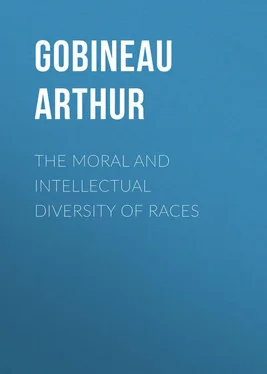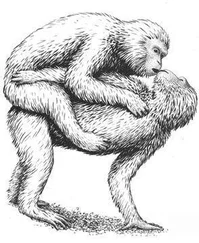Arthur Gobineau - The Moral and Intellectual Diversity of Races
Здесь есть возможность читать онлайн «Arthur Gobineau - The Moral and Intellectual Diversity of Races» — ознакомительный отрывок электронной книги совершенно бесплатно, а после прочтения отрывка купить полную версию. В некоторых случаях можно слушать аудио, скачать через торрент в формате fb2 и присутствует краткое содержание. Жанр: История, foreign_antique, foreign_prose, на английском языке. Описание произведения, (предисловие) а так же отзывы посетителей доступны на портале библиотеки ЛибКат.
- Название:The Moral and Intellectual Diversity of Races
- Автор:
- Жанр:
- Год:неизвестен
- ISBN:нет данных
- Рейтинг книги:4 / 5. Голосов: 1
-
Избранное:Добавить в избранное
- Отзывы:
-
Ваша оценка:
- 80
- 1
- 2
- 3
- 4
- 5
The Moral and Intellectual Diversity of Races: краткое содержание, описание и аннотация
Предлагаем к чтению аннотацию, описание, краткое содержание или предисловие (зависит от того, что написал сам автор книги «The Moral and Intellectual Diversity of Races»). Если вы не нашли необходимую информацию о книге — напишите в комментариях, мы постараемся отыскать её.
The Moral and Intellectual Diversity of Races — читать онлайн ознакомительный отрывок
Ниже представлен текст книги, разбитый по страницам. Система сохранения места последней прочитанной страницы, позволяет с удобством читать онлайн бесплатно книгу «The Moral and Intellectual Diversity of Races», без необходимости каждый раз заново искать на чём Вы остановились. Поставьте закладку, и сможете в любой момент перейти на страницу, на которой закончили чтение.
Интервал:
Закладка:
Mobile, Aug. 20, 1855.
CHAPTER I.
POLITICAL CATASTROPHES
Perishable condition of all human societies – Ancient ideas concerning this phenomenon – Modern theories.
The downfall of civilizations is the most striking, and, at the same time, the most obscure of all the phenomena of history. If the sublime grandeur of this spectacle impresses the mind with awe, the mystery in which it is wrapped presents a boundless field for inquiry and meditation to a reflecting mind. The study of the birth and growth of nations is, indeed, fraught with many valuable observations: the gradual development of human societies, their successes, conquests, and triumphs, strike the imagination in a lively manner, and excite an ever increasing interest. But these phenomena, however grand and interesting, seem susceptible of an easy explanation. We consider them as the necessary consequences of the intellectual and moral endowments of man. Once we admit the existence of these endowments, their results will no longer surprise us.
But we perceive that, after a period of glory and strength, all societies formed by man begin to totter and fall; all, I said, because there is no exception. Scattered over the surface of our globe, we see the vestiges of preceding civilizations, many of which are known to us only by name, or have not left behind them even that faint memorial, and are recorded only by the mute stones in the depths of primeval forests. 29If we glance at our modern States, we are forced to the conclusion that, though their date is but of yesterday, some of them already exhibit signs of old age. The awful truth of prophetic language about the instability of all things human, applies with equal force to political bodies and to individuals, to nations and their civilizations. Every association of men for social and political purposes, though protected by the most ingenious social and political ties and contrivances, conceals among the very elements of its life, the germ of inevitable destruction, contracted the day it was formed. This terrible fact is proved by the history of all ages as well as of our own. It is owing to a natural law of death which seems to govern societies as well as individuals; but, does this law operate alike in all cases? is it uniform like the result it brings about, and do all civilizations perish from the same pre-existing cause?
A superficial glance at the page of history would tempt us to answer in the negative, for the apparent causes of the downfall of the great empires of antiquity were very different in each case. Yet, if we pierce below the surface, we find in this very necessity of decay, which weighs so imperiously upon all societies without exception, the evidence of the existence of some general, though concealed, cause, producing a natural death, even where no external causes anticipate it by violent destruction. We also discover that all civilizations, after a short duration, exhibit, to the acute observer, certain intimate disturbances, difficult to define, but whose existence is undeniable; and that these present in all cases an analogous character. Finally, if we distinguish the ruin of civilizations from that of States (for we sometimes see the same culture subsist in a country under foreign domination, and survive the destruction of the political body which gave it birth; while, again, comparatively slight misfortunes cause it to be transformed, or to disappear altogether), we become more and more confirmed in the idea that this principle of death in all societies is not only a necessary condition of their life, independent, in a great measure, of external causes, but is also uniform in all. To fix and determine this principle, and to trace its effects in the lives of those nations, of whom history has left us records, has been my object and endeavor in the studies, the results of which I now lay before the reader.
The fact that every human agglomeration, and the peculiar culture resulting from it, is doomed to perish, was not known to the ancients. Even in the epochs immediately preceding ours, it was not believed. The religious spirit of Asiatic antiquity looked upon the great political catastrophes in the same light that they did upon the sudden destruction of an individual: as a demonstration of Divine wrath, visiting a nation or an individual whose sins had marked them out for signal punishment, which would serve as an example to those criminals whom the rod had as yet spared. The Jews, misunderstanding the meaning of the promise, believed their empire imperishable. Rome, at the very moment when the threatening clouds lowered in the horizon of her grandeur, entertained no doubt as to the eternity of hers. 30But our generation has profited by experience; and, as no one presumes to doubt that all men must die, because all who came before us have died; so we are firmly convinced, that the days of nations, as of individuals, however many they be, are numbered. The wisdom of the ancients, therefore, will afford us but little assistance in the unravelling of our subject, if we except one fundamental maxim: that the finger of Divine Providence is always visible in the conduct of the affairs of this world. From this solid basis we shall not depart, accepting it in the full extent that it is recognized by the church. It cannot be contested that no civilization will perish without the will of God, and to apply to the mortal condition of all societies, the sacred axiom by which the ancients explained certain remarkable, and, in their opinion, isolated cases of destruction, is but proclaiming a truth of the first order, of which we must never lose sight in our researches after truths of secondary importance. If it be further added that societies perish by their sins, I willingly accede to it; it is but drawing a parallel between them and individuals who also find their death, or accelerate it, by disobedience to the laws of the Creator. So far, there is nothing contradictory to reason, even when unassisted by Divine light; but these two truths once admitted and duly weighed, the wisdom of the ancients, I repeat, affords no further assistance. They did not search into the ways by which the Divine will effected the ruin of nations; on the contrary, they were rather inclined to consider these ways as essentially mysterious, and above comprehension. Seized with pious terror at the aspect of the wrecks, they easily imagined that Providence had specially interfered thus to strike and completely destroy once powerful states. Where a miracle is recorded by the Sacred Scriptures, I willingly submit; but where that high testimony is wanting, as it is in the great number of cases, we may justly consider the ancient theory as defective, and not sufficiently enlightened. We may even conclude, that as Divine Justice watches over nations unremittingly, and its decrees were pronounced ere the first human society was formed, they are also enforced in a predeterminate manner, and according to the unalterable laws of the universe, which govern both animated nature and the inorganic world.
If we have cause to reproach the philosophers of the earlier ages, for having contented themselves, in attempting to fathom the mystery, with the vindication of an incontestable theological truth, but which itself is another mystery; at least, they have not increased the difficulties of the question by making it a theme for a maze of errors. In this respect, they rank highly above the rationalist schools of various epochs.
The thinkers of Athens and Rome established the doctrine, which has retained its ground to our days, that states, nations, civilizations, perished only through luxury, enervation, bad government, corruption of morals, fanaticism. All these causes, either singly or combined, were supposed to account for the downfall of civilizations. It is a necessary consequence of this doctrine, that where neither of these causes are in operation, no destructive agency is at work. Societies would therefore possess this advantage over individuals, that they could die no other but a violent death; and, to establish a body politic as durable as the globe itself, nothing further would be necessary than to elude the dangers which I enumerated above.
Читать дальшеИнтервал:
Закладка:
Похожие книги на «The Moral and Intellectual Diversity of Races»
Представляем Вашему вниманию похожие книги на «The Moral and Intellectual Diversity of Races» списком для выбора. Мы отобрали схожую по названию и смыслу литературу в надежде предоставить читателям больше вариантов отыскать новые, интересные, ещё непрочитанные произведения.
Обсуждение, отзывы о книге «The Moral and Intellectual Diversity of Races» и просто собственные мнения читателей. Оставьте ваши комментарии, напишите, что Вы думаете о произведении, его смысле или главных героях. Укажите что конкретно понравилось, а что нет, и почему Вы так считаете.












